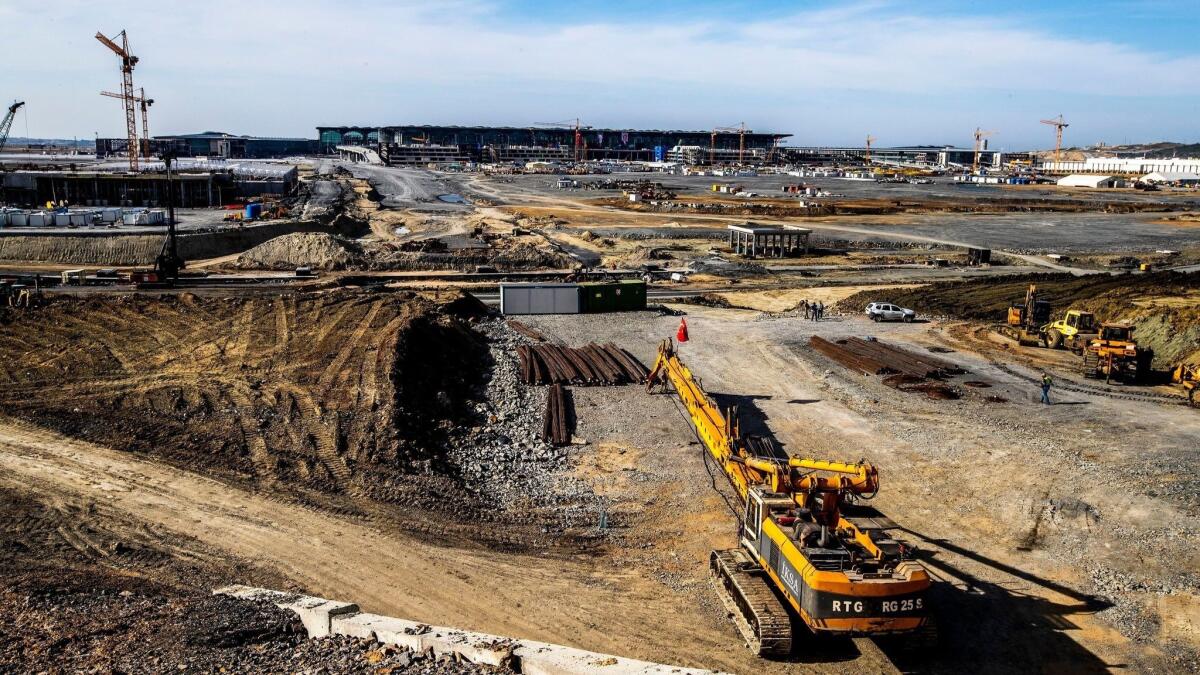U.S. tariffs only the latest setback for a Turkish economy running on borrowed cash

Reporting from Istanbul, Turkey — Cranes loom over this mega-city.
Vast construction projects — extravagant shopping malls, apartment towers wrapped in mirrored glass, expansive bridges, a $100-million mosque — are touted by the government of President Recep Tayyip Erdogan as symbols of Turkey’s prosperity and global clout.
But all of it is a credit-fueled facade. Turkey’s $900-billion economy is tanking.
The national currency, the lira, has lost 40% of its value this year as the markets have lost confidence in the government’s ability to manage the economy. A big chunk of that drop came Friday after the Trump administration imposed tariffs on metal imports from Turkey in an effort to apply pressure on authorities to release Andrew Brunson, an American pastor being tried in Turkey on terrorism charges.
The plunge last week sparked fears of contagion, particularly in Europe, where banks are acutely exposed to hundreds of billions of dollars in potentially toxic Turkish construction debt.
The crisis has been a long time coming. Years of economic mismanagement, nepotism and corruption, a stifling autocratic environment and aggressive foreign policy posturing have done much to create the conditions for the current collapse.
“Turkey’s negative political trajectory has undermined economic policymaking and the credibility of key economic institutions for some time,” said Wolfango Piccoli, co-president of Teneo Intelligence, a political risk advisory service headquartered in New York. “This is very much a self-inflicted currency crisis that has the potential to blow up into a full-scale economic and financial meltdown.”
Erdogan reinforced market fears following parliamentary and presidential elections in June when he appointed his inexperienced son-in-law, Berat Albayrak, as minister of treasury and finance and scuttled the central bank’s independence by giving himself the power to appoint its top members.
Many Turks are bracing for hurt as the currency loses value.
“It was already difficult to sell apartments, but it is about to get harder,” said the head of a midsized construction and manufacturing company in Istanbul, who asked not to be named for fear of retaliation by authorities, who have demanded bribes from him in the past.
“We will have to lower our prices just to service our bank loans, probably running at a loss for a few years.”
In Istanbul’s Sisli neighborhood, 31-year-old Mira Ece Akyildiz, who runs a gourmet pastry kitchen that employs nine people, is facing the very real chance of downsizing.
“Since I am purchasing everything from abroad using euros, it affects me deeply,” she said. “I have to offset these expenses by raising my prices.”
In his typically combative fashion, Erdogan has publicly rejected the notion that the economy is on the brink, deriding the lira’s slide as an “online fictional currency plot.” He has stood firm on his refusal to allow rate hikes in an attempt to slow inflation, which is currently at 15%.
“These are the bullets, cannonballs and missiles of an economic war waged against our country,” he said in a Saturday speech in his hometown of Rize, on the Black Sea.
The rhetoric appears to be an attempt to rally his conservative and nationalist base.
“Domestic attention is being diverted from economic issues to a supposed anti-Turkish international plot,” said Mateusz Chudziak, a Turkey analyst at the Center for Eastern Studies, a think tank in Warsaw. “The aim is to defend Erdogan’s domestic position.”
The Brunson case appears to be part of that strategy. For decades, the 50-year-old evangelical pastor from North Carolina had been based in the coastal city of Izmir. Arrested in 2016 after a failed coup, he stands accused of being allied with Fethullah Gulen, a Turkish cleric based in Pennsylvania who Erdogan says masterminded the attempted takeover by the military.
Many observers say Erdogan is holding Brunson to put pressure on the U.S. to extradite Gulen.
Trump, who enjoys strong support from evangelicals, has dug in deeper. In addition to imposing tariffs, he froze the assets of the interior and justice ministers, both members of the ruling Justice and Development Party, or AKP.
Ozgur Unluhisarcikli, Ankara office director at the German Marshall Fund of the United States, a public policy think tank, said Trump has pushed Erdogan into a corner.
“I think Erdogan would accept an honorable way out of this crisis,” he said. “Since the Trump administration cannot accept a solution in which Brunson is not released, Erdogan needs to be offered something in return, so that it looks like a compromise rather than his defeat.”
In interviews in Istanbul’s conservative Fatih district, nestled on the fringes of the Golden Horn inlet, ordinary citizens sided strongly with their president against the U.S.
“They demand everything from us, but give us nothing in return,” said a 32-year-old man hawking watches and sunglasses from a tiny shop. “We want Fethullah.”
“Trump, we cuss him every day,” he added.
Regardless of the fallout from the Brunson case, the Turkish economy is in desperate need of fresh thinking, analysts said.
Rebuilding the agricultural sector and encouraging industrial production could help bolster the economy. Meanwhile, Erdogan’s construction binge is damaging the economy, despite any short-term benefits. Fueling economic growth with massive debt eventually becomes unsustainable.
“The economic model of development used by the AKP is well past its expiry date,” said Piccoli. “Looking ahead, the key question is whether those in power now have the skills and knowledge to devise a new model of economic development. It is doubtful.”
Johnson is a special correspondent.
More to Read
Sign up for Essential California
The most important California stories and recommendations in your inbox every morning.
You may occasionally receive promotional content from the Los Angeles Times.










